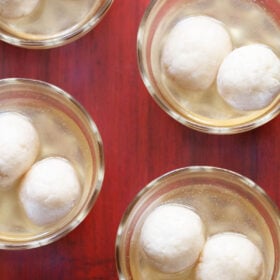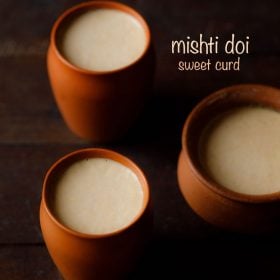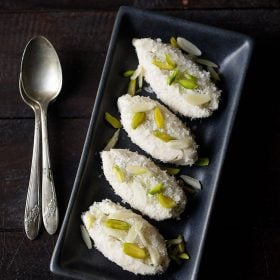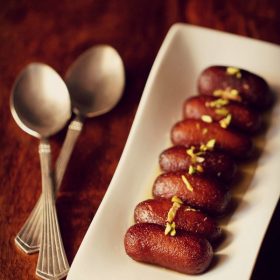Chhena Poda Recipe | Chenna Poda
Here’s one of the much-celebrated sweet dishes from the beautiful state of Odisha, the Chhena Poda or Chenna Poda. I mean there’s nothing in this preparation that is not to like. Read: fresh paneer or chenna, sugar, ghee and flavorings. The ingredient list of the Chhena Poda Recipe may also be minimal, but then, it does take some time to get done as it has to be baked. The classic preparation actually uses a chulha (small earthen/brick stove). Since at home, you bake it in an oven, it can also be referred to a paneer cake.
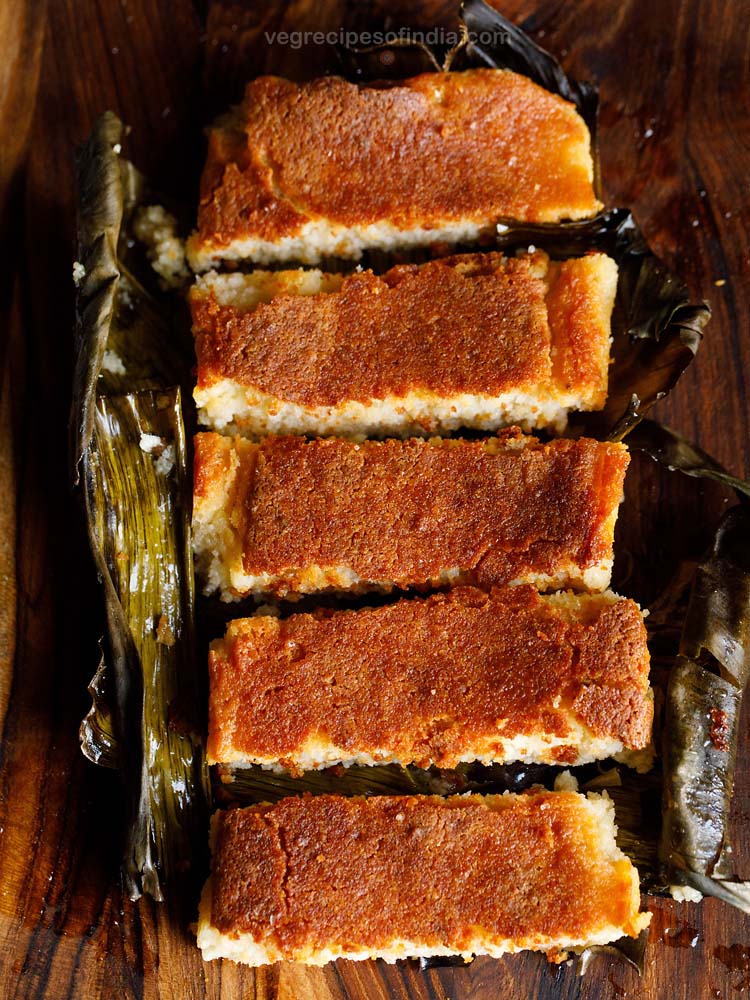

What is Chhena Poda
The Odiya term Chhena Poda literally translates to roasted or baked cheese in English language. Traditionally, this sweet dish is made of fresh cheese or chenna, which is well-kneaded with sugar and some other ingredients. Then, baked or roasted in a small earthen stove called ‘chulha,’ till the crust browns due to the caramelization of the sugar.
This results in a decadent dessert, which is really hard to resist and is quite addictive. Chenna Poda is believed to be highly favored by Lord Jagannath, the main deity of Puri Jagannath Temple in Odisha. This sweet treat gains popularity during significant festivals such as Durga Puja and Diwali.
It is believed that the original Chhena Poda Recipe dates back to the first half of the 20th century, with its origin in Dasapalla, a village in Odisha. Here, a gentleman named Sudarshan Sahu accidently came up with this dish, after adding sugar and seasonings to leftover chenna (cottage cheese) and leaving it in a preheated chulha that baked it into a sumptuous dessert.
About this recipe
A few years back, I had got some recipe requests that were particularly a part of the ‘chappan bhog recipes (56 dishes)’ that are offered to Lord Jagannath.
Since then, I had been working on all the recipes and really plan to add them all, one by one. However, it was best to begin with a sweet that is his favorite. Hence, this Chhena Poda Recipe.
Making Chenna Poda is very easy. You will be surprised by the factor of simplicity and ease that this recipe holds. Unlike other baking recipes, which involve 2 to 3 steps and are quite intricate, this is a one-bowl recipe.
Also, most of the times while baking cakes, things do go wrong. But you can’t really go wrong in making this super delicious paneer cake. This is the hallmark of this recipe.
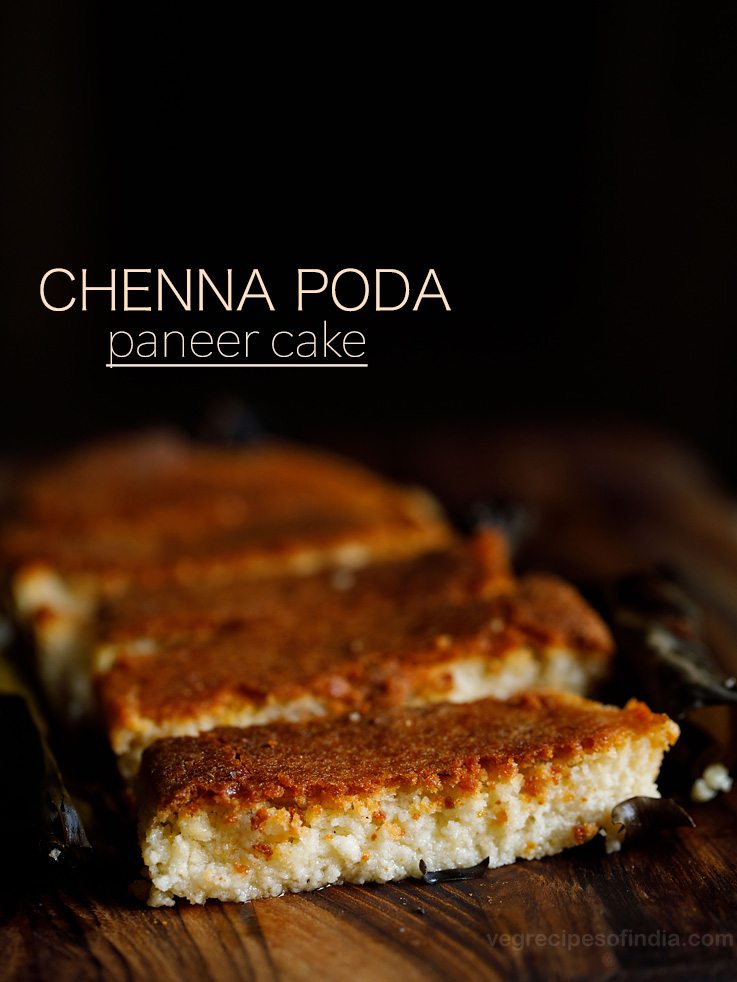

To make Chhena Poda, you can either use fresh chenna/paneer or the store brought one. Though freshly made chenna gives great results, I happened to use the paneer which was made a day before. If you plan to make chenna at home, then use 2-liter milk and follow the method as shared on this post of How To Make Chenna.
I have made this Chhena Poda Recipe a couple of times and each time it has been good. When baking, the sugar gets caramelized and imparts a lovely flavor in this dessert. When I started making this dish, I use to refer a few cookbooks. Once I got the knack of the recipe, I adapted from the cook recipes and made changes in my recipe, largely to suit our tastebuds. My recipe can be easily halved, doubled or tripled.
In Odisha, Chenna Poda is usually baked in sal leaves which gives the dish an amazingly unique flavor. Since, I had banana leaves at home, I used them to bake this sweet dish. You can even skip using the plantain leaves completely and simply bake in a pan in an oven or even in a pressure cooker.
In a pressure cooker, baking the Chhena Poda will take about 25 to 35 minutes. If you want to use a pressure cooker, then check how to go about it here:
You can serve this super yummy dish as a sweet snack or an after-meal dessert; or even offer it to the deities as bhog or naivedyam. If you plan to use it for religious offerings, then use homemade paneer instead of store bought one and prepare the dish with devotion and love.
Step-by-Step Guide
How to make Chhena Poda
Preparation
1. Firstly, line a baking pan with some chopped banana leaves. Grease the banana leaves with some ghee. You can also use butter paper or parchment paper instead of banana leaves. Or you can skip everything and just grease the pan with ghee on all sides.
Also, preheat oven at 180 degrees C for 15 minutes.
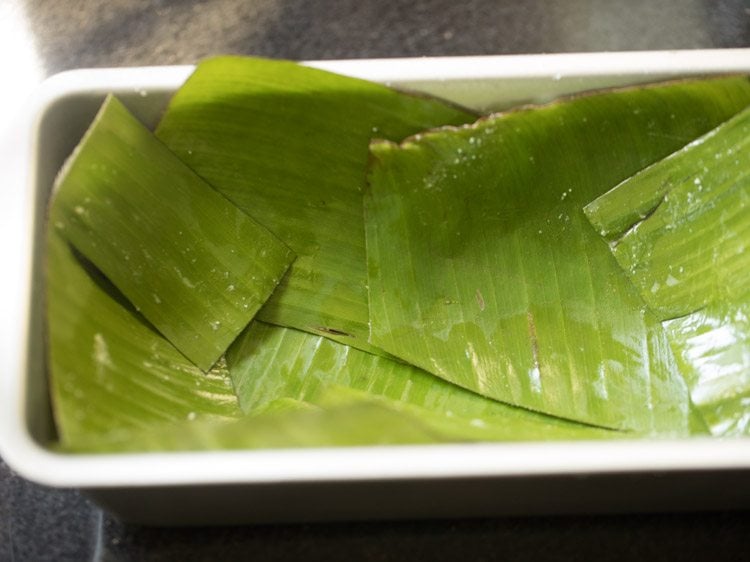

Making Chhena Poda mixture
2. Take 250 grams fresh paneer or chenna and crumble it very well.
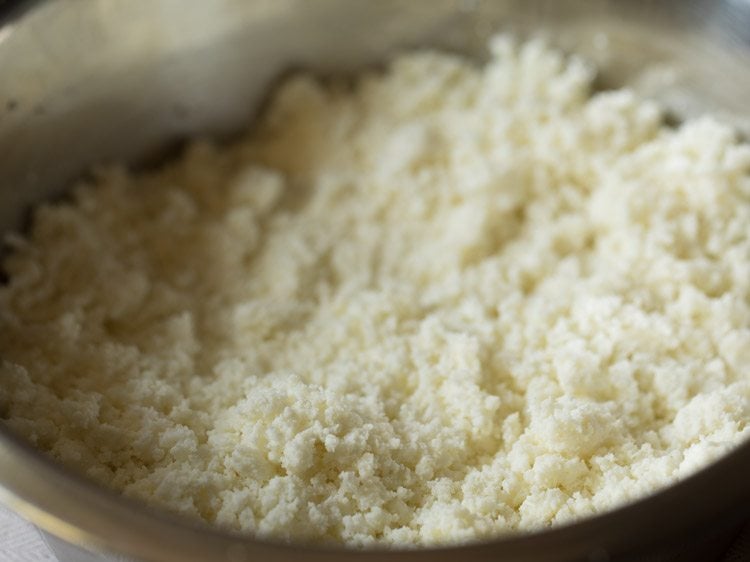

3. Then, add ½ cup sugar. You can also use ½ cup jaggery powder, instead of sugar.
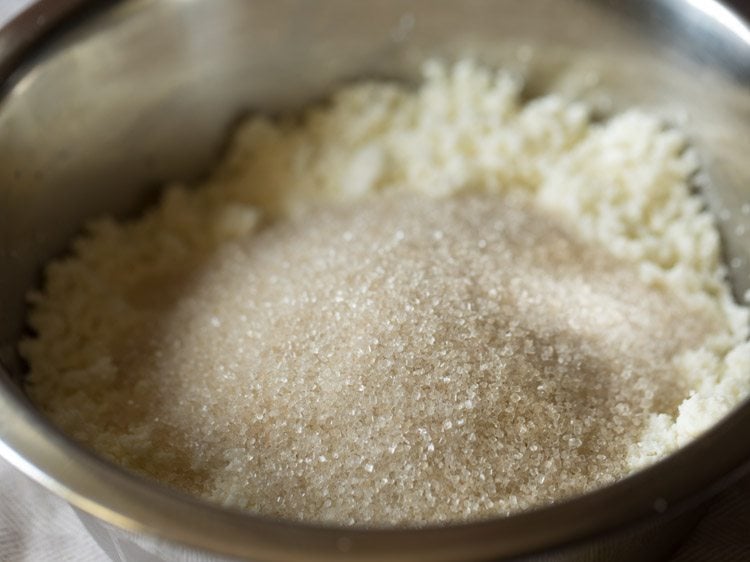

4. With clean hands, mix sugar with the chenna.
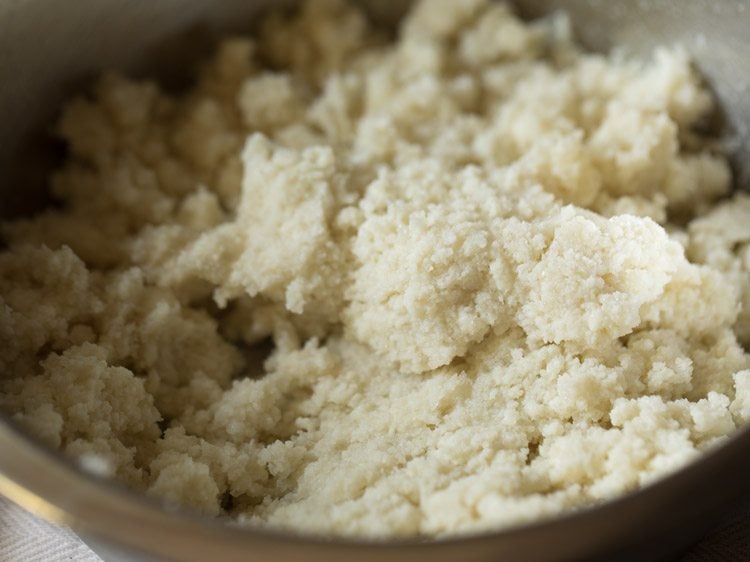

5. Continue to mash and knead the chenna, like the way you would knead a chapatti dough.
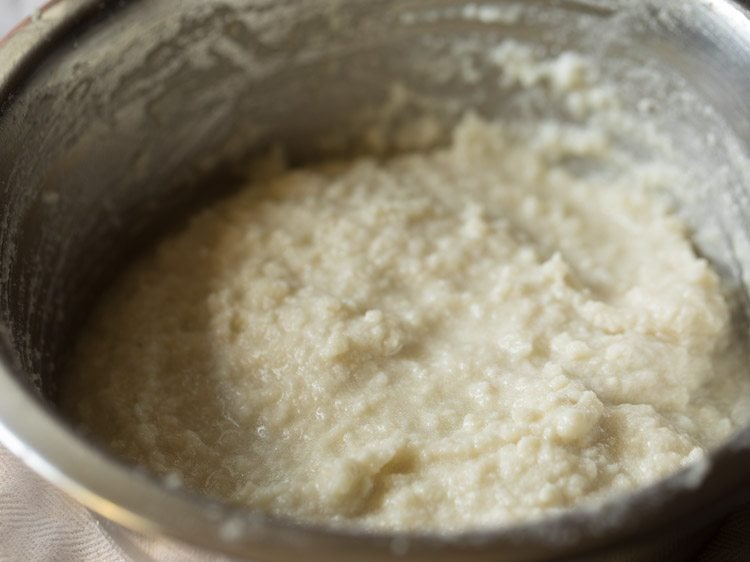

6. The paneer mixture has to become loose, light and with a cake batter like consistency. The more light and softer the consistency, the better the Chhena Poda will taste. You can see the consistency below. I have not added any milk or water. In case the mixture looks dry, you can add a few tablespoons of milk or water. Some amount of fat is released while mashing the chenna and that’s fine.
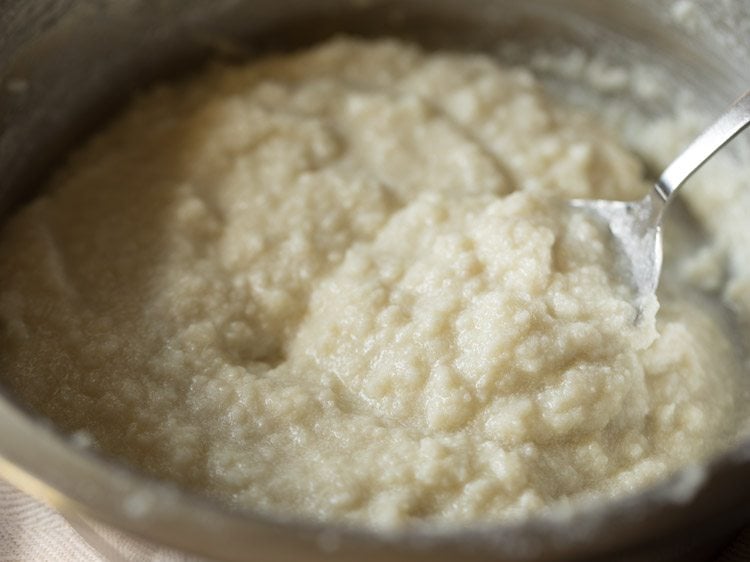

7. Once you get a batter like consistency in the chenna mixture, add ½ teaspoon cardamom powder and ½ tablespoon rice flour. Optionally, a pinch of baking soda can also be added. But does not make any difference. Instead of rice flour, you can also use fine rava or sooji. Some chopped dry fruits like cashews, almonds and raisins can also be added.
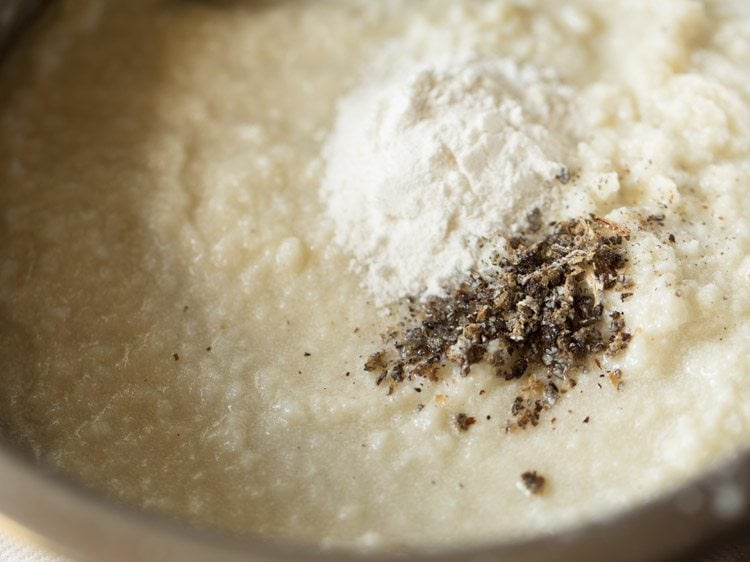

Baking Chhena Poda
8. Pour the prepared mixture in the lined pan. Shake the pan gently so that the mixture spreads evenly. Level the top with a spatula.
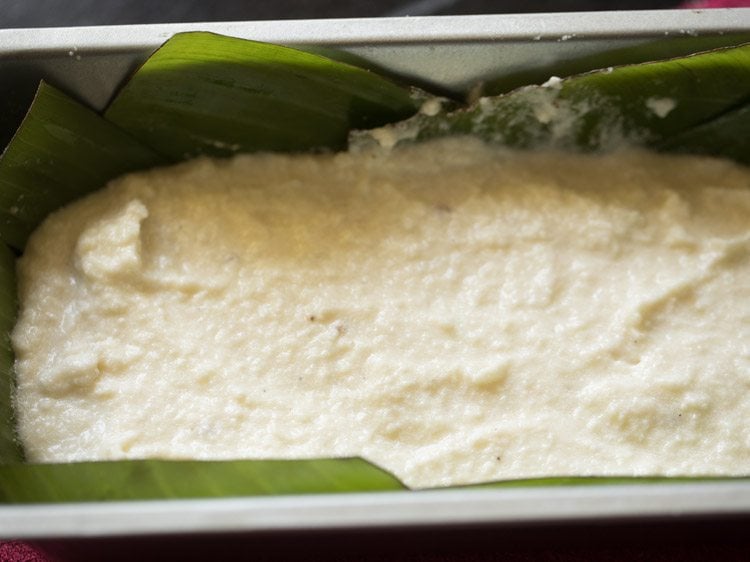

9. Place the pan in the oven and bake Chenna Poda for 30 to 45 minutes. If using OTG, use the toast mode and keep the pan in the center. Bake till the top crust gets a dark golden color. Oven times vary, so do keep a check. In some ovens, baking this paneer cake can even take less time. I am giving an average time that will work for most ovens.
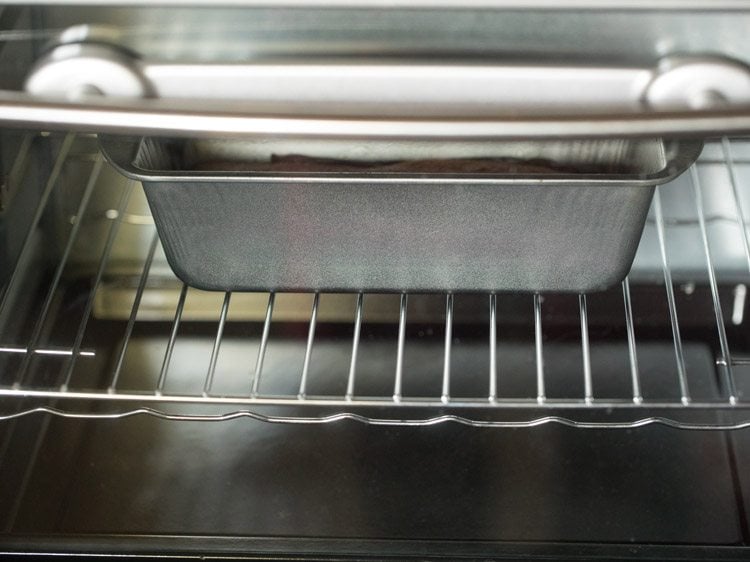

10. Remove Chenna Poda from the oven, once done.
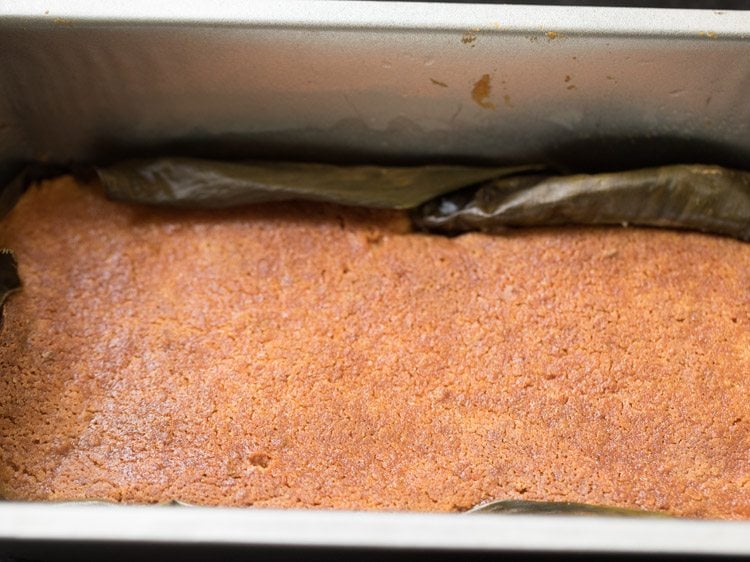

11. Then, check with a bamboo skewer or toothpick and it should be clean. There should be no sticky batter on the toothpick.
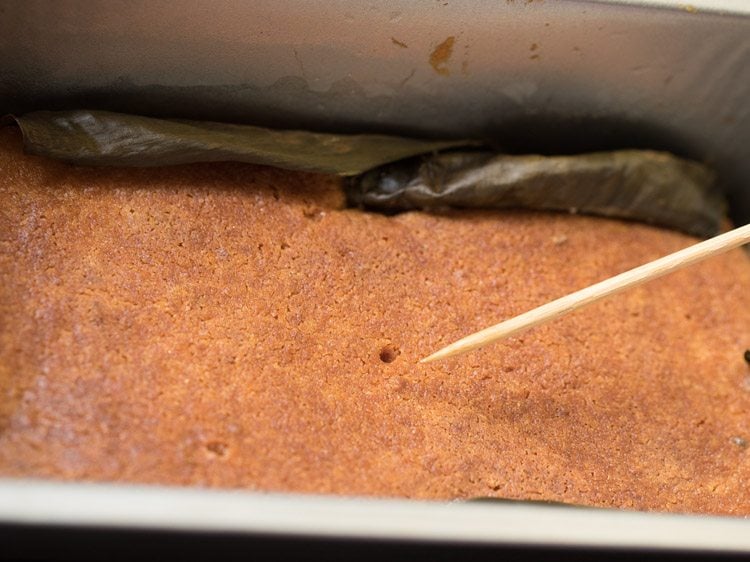

12. Let the Chenna Poda cool completely in the pan. Then, demould it.
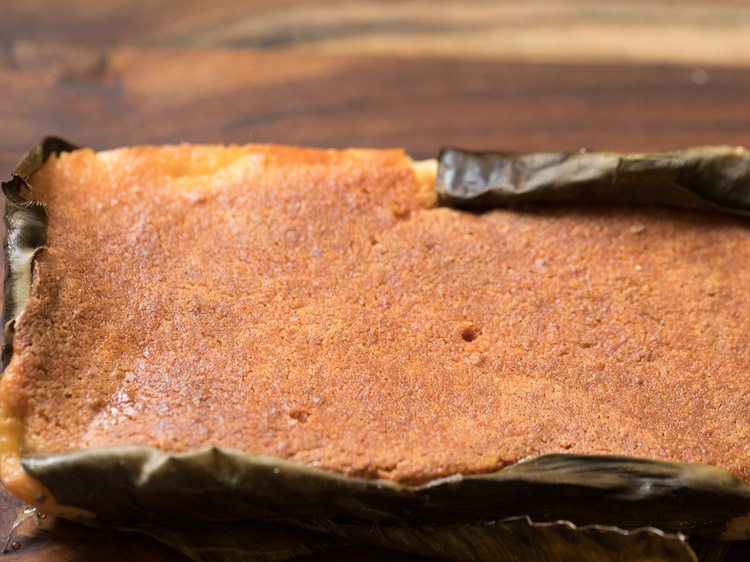

13. You can slice and serve it. Leftover can be refrigerated for 2 to 3 days.
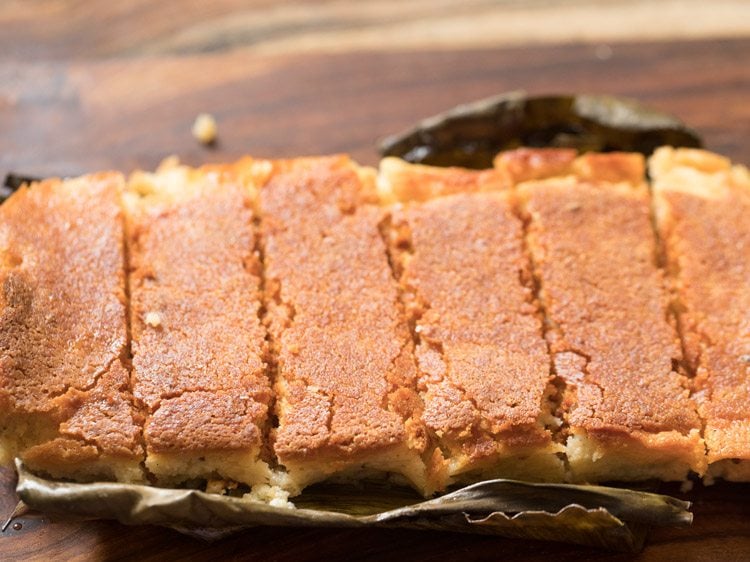

14. Serve Chhena Poda as a dessert after meals or as a sweet snack.
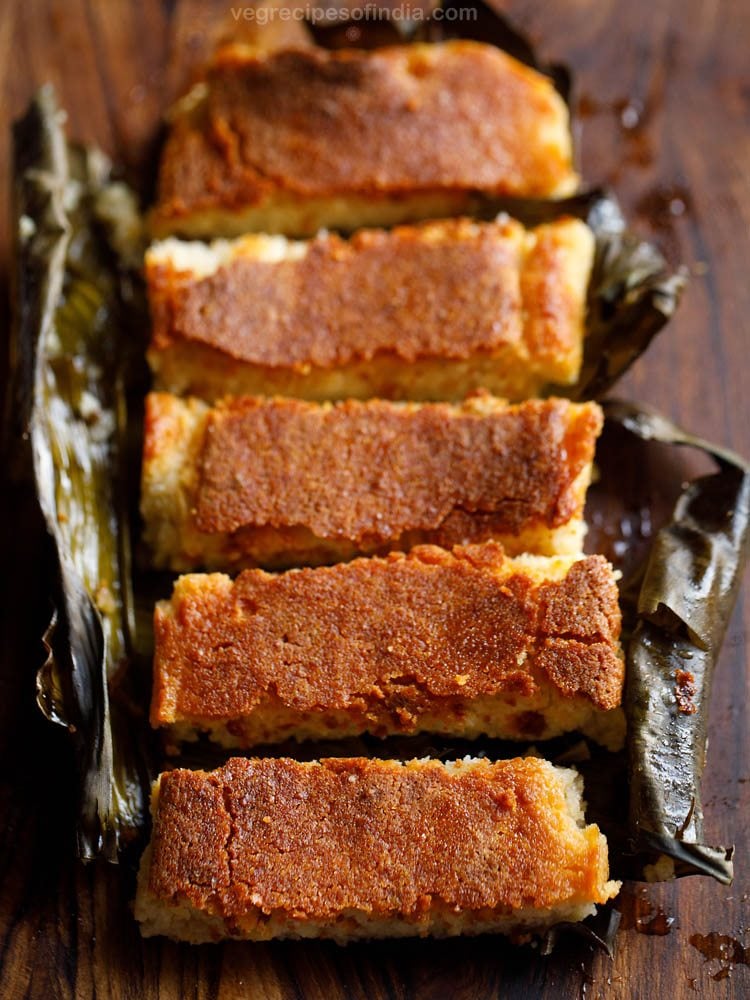

Expert Tips
- If using banana leaves, grease them with some ghee and then use. You can even use butter or parchment paper instead of these leaves. Or skip everything all together and just grease your pan on all side with ghee.
- ½ cup jaggery powder can be used instead of the sugar.
- You have to make a paneer mixture that’s loose, light and has a cake batter like consistency. The lighter and softer it is, the better the result will be. In case your mixture is dry, add a few tablespoons of milk or water to get it to the right consistency.
- You can add fine rava or sooji instead of the rice flour. You can also add some chopped nuts and dry fruits for that extra flavor.
- If you are baking the dish in an OTG, use the toast mode and keep the pan in the center. Oven times will vary. So, keep a check.
- Halving, doubling and tripling the quantities of this recipe is possible.
More Sweet Recipes To Try!
Sweets Recipes
Gluten Free Recipes
North Indian Food
Please be sure to rate the recipe in the recipe card or leave a comment below if you have made it. For more vegetarian inspirations, Sign Up for my emails or follow me on Instagram, Youtube, Facebook, Pinterest or Twitter.
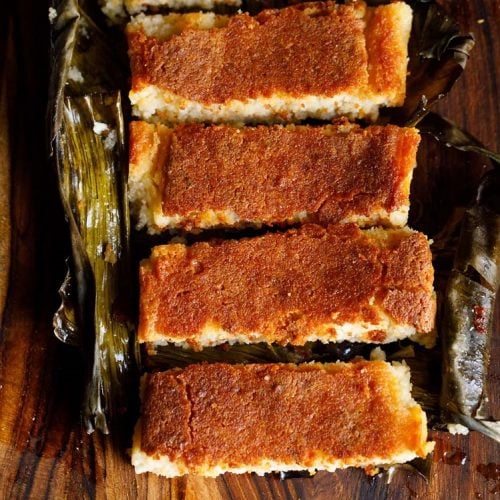

Chhena Poda | Chenna Poda
Chenna poda is a popular sweet from odisha. Its made with chenna or fresh paneer. The entire dish is baked and can also be called as paneer cake.
Prep Time 10 minutes
Cook Time 30 minutes
Total Time 40 minutes
Prevent your screen from going dark while making the recipe
preparation
Firstly line a baking pan with some chopped banana leaves. Grease the banana leaves with some ghee.
You can also use butter paper or parchment paper instead of banana leaves. Or you can skip everything and just grease the pan with ghee on all sides.
Also preheat oven at 180 degrees celsius for 15 minutes.
making chhena poda mixture
Then take the 250 grams fresh paneer or chenna and crumble it very well.
Then add ½ cup sugar. You can also use ½ cup jaggery powder instead of sugar.
With clean hands mix sugar with the chenna.
Then continue to mash and knead the paneer or chenna like the way you would knead a chapati dough.
The paneer mixture has to become loose, light and with a cake batter like consistency. The more light and softer the consistency, the better the chhena poda tastes.
I have not added any milk or water. In case the mixture looks dry, then you can add a few tablespoons of milk or water. Some amount of fat is released while mashing chenna and thats fine.
Once you get a cake batter like consistency in the paneer mixture, then add ½ teaspoon cardamom powder and ½ tablespoon rice flour. Optionally a pinch of baking soda can also be added, but does not make any difference. Instead of rice flour, you can also use fine rava (sooji). Some chopped dry fruits like cashews, almonds and raisins can also be added.
baking chhena poda
Pour the chhena poda mixture in the pan. Shake the pan gently so that the chenna poda mixture spreads evenly. Level the top with a spatula.
Place the pan in the oven and bake chena poda for 30 to 45 minutes. If using otg, use the toast mode and keep pan in the center. Bake chena poda till the top crust gets a dark golden color. Oven times vary, so do keep a check. In some ovens this paneer cake can even take less time. I am giving an average time that will work for most ovens.
Remove from the oven once done.
Then check with a bamboo skewer or toothpick and it should be clean. There should be no sticky batter on the toothpick.
Let the paneer cake cool completely in the pan. Then remove it.
You can slice and then serve chenna poda. Leftover can be refrigerated for 2 to 3 days.
Serve chhena poda as dessert after meals or as a sweet snack.
- The recipe can be easily halved, doubled or tripled.
Nutrition Facts
Chhena Poda | Chenna Poda
Amount Per Serving
Calories 195 Calories from Fat 99
% Daily Value*
Fat 11g17%
Saturated Fat 6g38%
Cholesterol 29mg10%
Sodium 10mg0%
Carbohydrates 18g6%
Sugar 16g18%
Protein 5g10%
Calcium 200mg20%
* Percent Daily Values are based on a 2000 calorie diet.
This Chhena Poda Recipe from the archives was first published in May 2017. It has been updated and republished in March 2024.
[ad_2]


